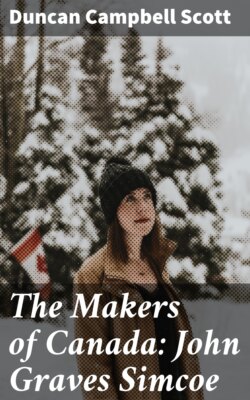Читать книгу The Makers of Canada: John Graves Simcoe - Duncan Campbell Scott - Страница 10
BEFORE UPPER CANADA: 1781 TO 1791
ОглавлениеSimcoe returned to England, his health broken by the hardships he had undergone and his spirit unstrung by the failures and defeats that he had done his utmost to avoid. His arrival in England did not go unnoticed. The king had observed the service of one of his youngest officers, and Lord Germain had written to Sir Henry Clinton when it was supposed that Simcoe had been killed: "I should be glad he had been in a situation to be informed that his spirited conduct had been approved of by the king." Now on December 19th, 1781, His Majesty conferred upon him the rank of lieutenant-colonel in the army, which rank he had before only held nominally. After his departure the Queen's Rangers fell under the displeasure of Sir Guy Carleton, who had succeeded Sir Henry Clinton in command of the army, and the promotions were not allowed to go in the corps. But through the influence of Sir Henry Clinton, on December 25th, 1782, the rank of all officers in the regiment was made universally permanent and it was placed on the roster of the British army. At the close of the war the corps was disbanded and many of the men chose to settle in Nova Scotia, where lands were granted them.
During the years immediately following his arrival in England, Simcoe rested and endeavoured to win back his strength. The family estate, Wolford Lodge, in the county of Devon, beautifully situated, surrounded by a park-like and peaceful country, gave him the needed change from the rigorous climate to which he had been exposed, and the well-ordered life of an English gentleman soon repaired the havocs of camp-life. But while he rested he was still active in his interest in public affairs, and was not lost sight of by the government.
On December 30th, 1782, he was married to Elizabeth Posthuma, only daughter of Colonel Thomas Gwillim, of Old Court, Herefordshire. His wife was her father's only daughter and heir. The Gwillim family is very honourable, and traces its source in a direct line to the ancient kings of North and South Wales and the celebrated Herald Gwillim. Colonel Gwillim, the father of Elizabeth Posthuma, had been aide-de-camp to General Wolfe, which fact proves his worth as an officer. Lieutenant-Colonel Simcoe and his wife were distantly related through a mutual relationship with the wife of Admiral Graves, closer upon Miss Gwillim's side. She was handsome in person, of an artistic temperament, cultivated and refined, in manner gentle and retiring. Simcoe was, in contrast, lively and energetic, with social qualities which made him eminent either as guest or host. His round, amiable face shows to less advantage in his portraits than when in life it was lit by his small but vivacious eyes and his friendly, engaging smile. The young couple spent the first years of their wedded life between Wolford Lodge and London, where Simcoe began to be called more frequently in consultation by the military authorities upon special subjects upon which his experience made his opinion of value. It was seen that he inherited his father's clearsightedness and his lucidity of statement.
On January 14th, 1783, his exchange was signed at Passy by Benjamin Franklin, and Simcoe was released from his parole. He was again free to engage in active service but no occasion offered. The administration and improvement of his estate took up the greater part of his time. In general study and in the composition of the "Military Journal" he found the intellectual employment which re-created his mind. A few verses of his have been preserved which discover his vein of natural sentiment if not any remarkable poetic gifts. There is a long piece in four-line stanzas entitled "Clementina," which proves that he knew by heart the "Elegy Written in a Country Churchyard." In rhymed couplets he has celebrated an encounter in the Revolutionary War in which the disastrous effect of a bullet upon the Highland bagpipes, and, therefore, upon the spirit of the corps, is described. His most successful essay in verse may here be quoted:—
